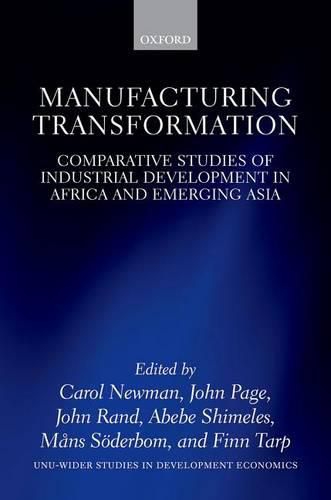Readings Newsletter
Become a Readings Member to make your shopping experience even easier.
Sign in or sign up for free!
You’re not far away from qualifying for FREE standard shipping within Australia
You’ve qualified for FREE standard shipping within Australia
The cart is loading…






While it is possible for economies to grow based on abundant land or natural resources, more often structural change-the shift of resources from low-productivity to high-productivity sectors-is the key driver of economic growth. Structural transformation is vital for Africa. The region’s much-lauded growth turnaround since 1995 has been the result of making fewer economic policy mistakes, robust commodity prices, and new discoveries of natural resources. At the same time, Africa’s economic structure has changed very little. Primary commodities and natural resources still account for the bulk of the region’s exports. Industry is most often the leading driver of structural transformation. Africa’s experience with industrialization over the past thirty years has been disappointing. In 2010, sub-Saharan Africa’s average share of manufacturing value added in GDP was ten per cent, unchanged from the 1970s. Actually, the share of medium- and high-tech goods in manufacturing production has been falling since the mid-1990s. Per capita manufactured exports are less than ten per cent of the developing country average. Consequently, Africa’s industrial transformation has yet to take place. This book presents results of comparative country-based research that sought to answer a seemingly simple but puzzling question: why is there so little industry in Africa? It brings together detailed country case studies of industrial policies and industrialization outcomes in eleven countries, conducted by teams of national researchers in partnership with international experts on industrial development. It provides the reader with the most comprehensive description and analysis available to date of the contemporary industrialization experience in low-income Africa. This is an open access title available under the terms of a CC BY-NC-SA 3.0 IGO licence. It is free to read at Oxford Scholarship Online and offered as a free PDF download from OUP and selected open access locations.
$9.00 standard shipping within Australia
FREE standard shipping within Australia for orders over $100.00
Express & International shipping calculated at checkout
While it is possible for economies to grow based on abundant land or natural resources, more often structural change-the shift of resources from low-productivity to high-productivity sectors-is the key driver of economic growth. Structural transformation is vital for Africa. The region’s much-lauded growth turnaround since 1995 has been the result of making fewer economic policy mistakes, robust commodity prices, and new discoveries of natural resources. At the same time, Africa’s economic structure has changed very little. Primary commodities and natural resources still account for the bulk of the region’s exports. Industry is most often the leading driver of structural transformation. Africa’s experience with industrialization over the past thirty years has been disappointing. In 2010, sub-Saharan Africa’s average share of manufacturing value added in GDP was ten per cent, unchanged from the 1970s. Actually, the share of medium- and high-tech goods in manufacturing production has been falling since the mid-1990s. Per capita manufactured exports are less than ten per cent of the developing country average. Consequently, Africa’s industrial transformation has yet to take place. This book presents results of comparative country-based research that sought to answer a seemingly simple but puzzling question: why is there so little industry in Africa? It brings together detailed country case studies of industrial policies and industrialization outcomes in eleven countries, conducted by teams of national researchers in partnership with international experts on industrial development. It provides the reader with the most comprehensive description and analysis available to date of the contemporary industrialization experience in low-income Africa. This is an open access title available under the terms of a CC BY-NC-SA 3.0 IGO licence. It is free to read at Oxford Scholarship Online and offered as a free PDF download from OUP and selected open access locations.